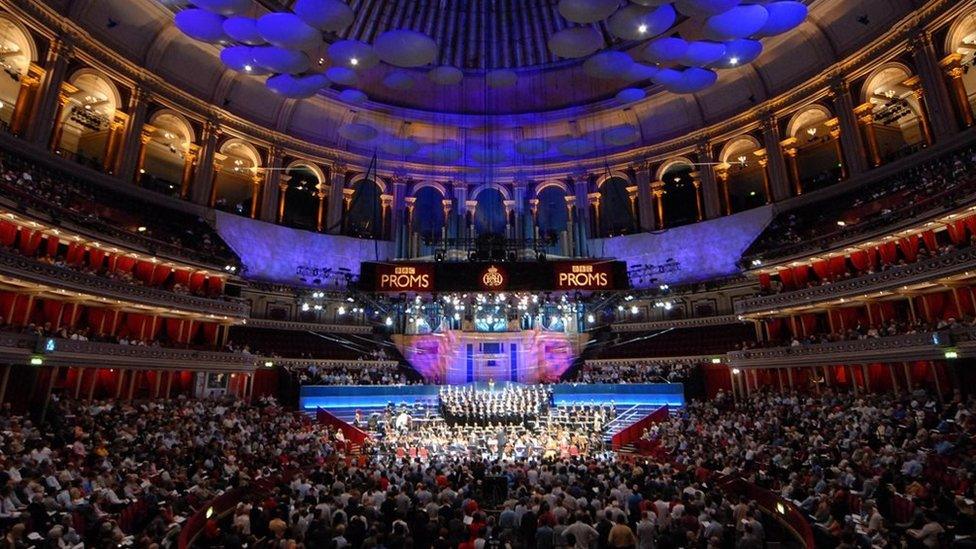EU anthem played at Proms' first night
- Published
Pianist Igor Levit surprised audiences at the first night of the BBC Proms by improvising a version of the EU Anthem.
The 30-year-old played Beethoven's Ode To Joy as an unscripted encore, wearing an EU flag on his lapel pin.
Although he gave no explanation for the choice, Levit is a fierce advocate of the EU, which he has described as "a project of unity and peace".
He has also challenged European politicians to stand up to the "angry, dangerous" rhetoric of President Trump.
After coming off stage at the Royal Albert Hall, the musician tweeted, external: "Hey guys, I've been away for an hour and a half. Is @realDonaldTrump still President?"
The BBC said it had been aware of his intention to play Ode To Joy in advance but saw it "an artistic choice".
Levit based his initial phrases on Liszt's transcription then segued into his own, lyrical improvisations.
The pianist has been called "the future of piano" and the "player of the century". He was born in Russia in 1987, but moved to Germany at the age of eight.
At that age, he had already been playing for five years. His first recording (of Beethoven's late sonatas, usually tackled much later in a pianist's career) brought him widespread acclaim; and he won the 2014 newcomer categories in both the BBC Music Magazine and Royal Philharmonic Society awards.
Having adopted Germany as his home, he describes himself as "a grateful, happy, respectful, political, curious and responsible European".
When Britain voted to leave the union last June, he posted an image of the EU flag, external, missing one star, accompanied by a sad face emoji.
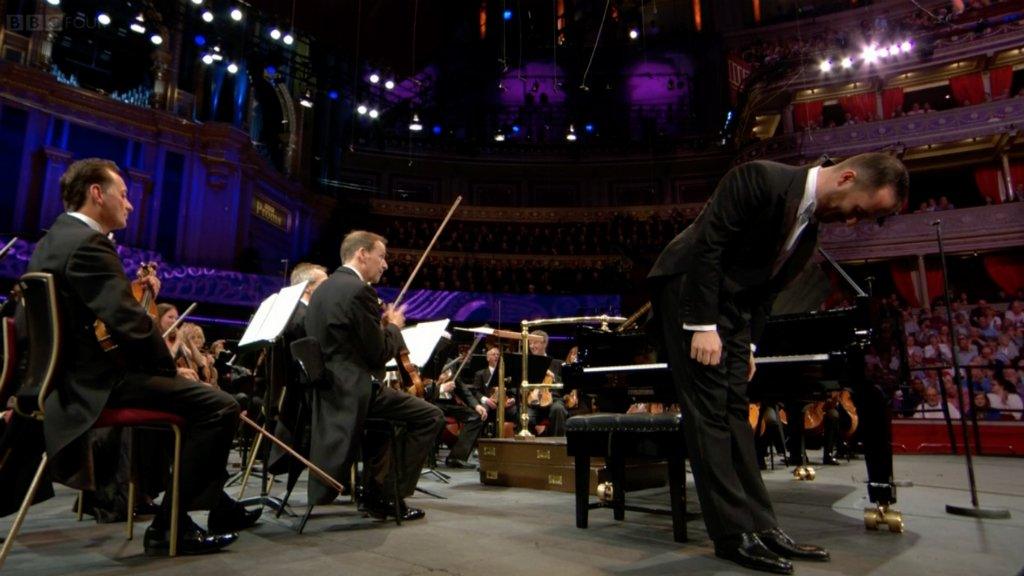
Levit received a rapturous reception for his performances, backed by the Symphony Orchestra
Levit's billed performance, of Beethoven's third piano concerto, occupied most of the first half of the Proms' opening night.
Tackling one of the composer's most soulful pieces, he played with nuanced intimacy, and seemed visibly moved towards the climax.
Earlier, the 123rd Proms season had opened with the world premiere of St John's Dance, by 29-year-old British composer Tom Coult.
The five-minute piece was inspired by a bizarre social phenomenon from medieval Europe, known as dancing mania.
According to Proms presenter Katie Derham, it would find "groups of peasants" dancing "in a trance-like state for days or even weeks on end, often until they collapsed".
Appropriately, then, Coult's composition was a discordant and often frantic cacophony of competing phrases. Or, in his own words: "A relentless series of dances, often spiralling out of control, often with two or more heard simultaneously."
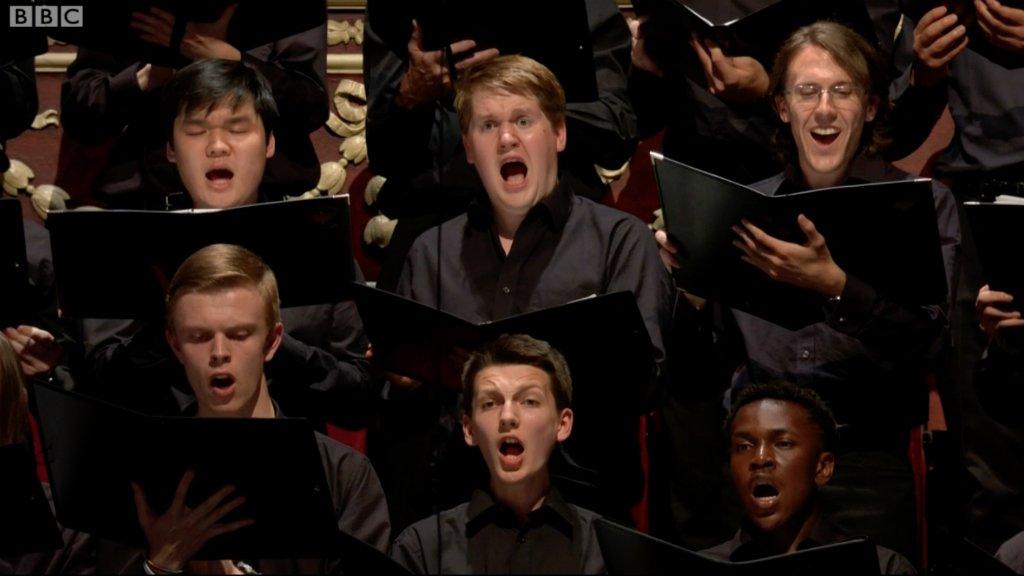
The Proms Youth Choir aims to let amateur and professional singers perform at the highest level with professional symphony orchestras
After the interval, the first night audience were treated to a choir of more than 400 people performing John Adams' Harmonium.
The mass chorus included the BBC Symphony Chorus and the BBC Proms Youth Choir. Many of the latter were newcomers to classical music - including a beatboxer and a death metal vocalist.
Their shimmering, mesmeric performance was conducted by Edward Gardner, who paid tribute to the choristers, saying: "I'm completely moved by the commitment of people who have been learning this piece for six months and haven't sung in any kind of organised choir before".
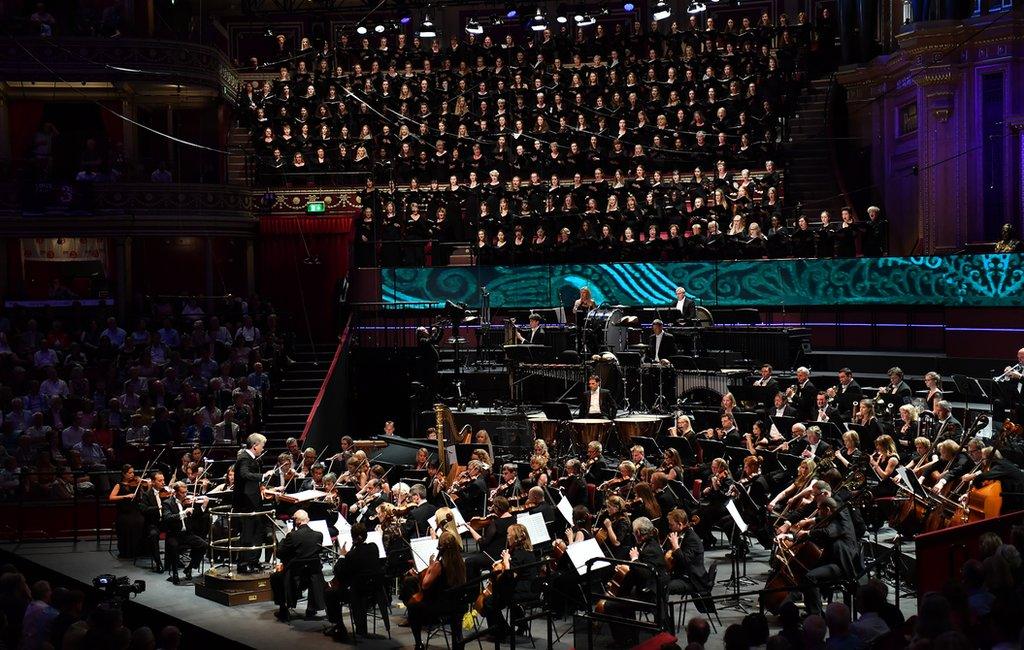
The chorus stretched up to the rafters of the Royal Albert Hall
Based on poetry by John Donne and Emily Dickinson, Harmonium is a complex work featuring hundreds of "human voices riding upon waves of rippling sound," in Adams' own words, external.
It is perceived as a work of minimalism, but Gardner challenged that view.
"When we speak about minimalism, we think about something quite clinical, quite mathematical," he said, introducing the piece on BBC Two.
"Although this piece has some of those elements - it has a very strong pulse, sometimes it has the chorus singing individual notes with one syllable - this piece rises emotionally way above anything I consider to be minimalist.
"It's much more of a romantic piece. It's about everything we deal with through life and towards death."
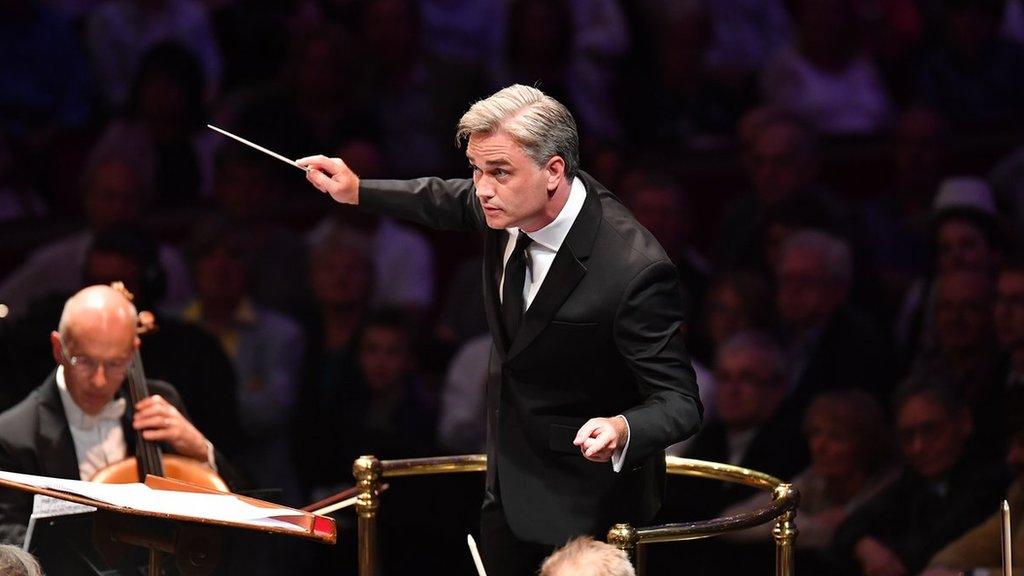
Edward Gardner took the helm for the high-profile First Night
John Adams' music will feature throughout the 2017 Proms season, in honour of the US composer's 70th birthday. An excerpt of his new opera, Girls of the Golden West, will be played at the Last Night, on 9 September.
Overall, the season incorporates more than 90 shows, including performances in Hull and a tribute to cult musician Scott Walker.
Stars including Nicola Benedetti, Jarvis Cocker, Beatrice Rana, Daniel Barenboim, Jools Holland and Tom Jones all appear on the line-up.
All of this year's concerts will be broadcast on BBC Radio 3, and more than 20 will be filmed for television or the iPlayer. The BBC is also experimenting with lossless audio - by streaming the season in CD quality via the BBC Proms website.

Follow us on Facebook, external, on Twitter @BBCNewsEnts, external, or on Instagram at bbcnewsents, external. If you have a story suggestion email entertainment.news@bbc.co.uk, external.

- Published14 July 2017
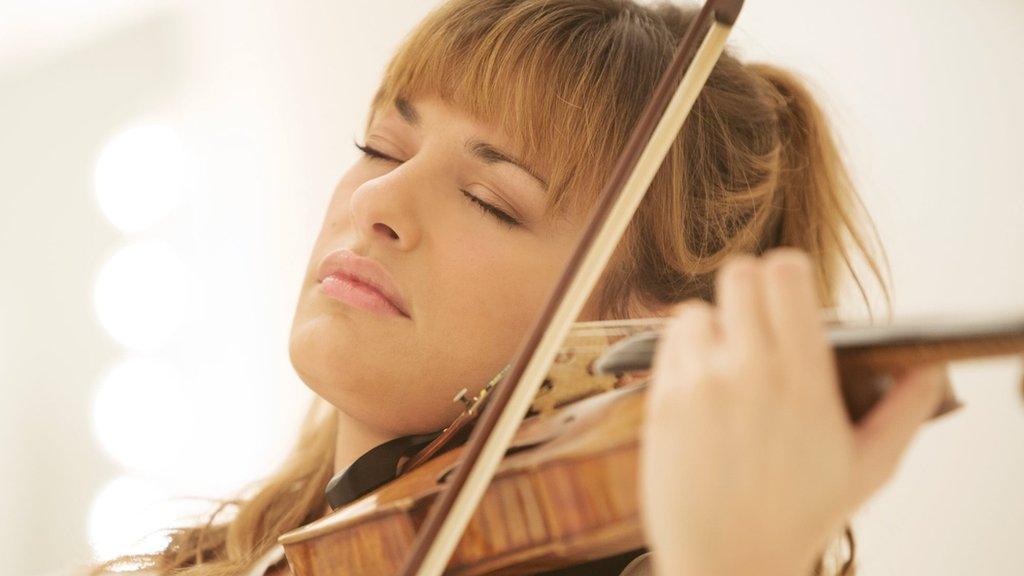
- Published3 July 2017
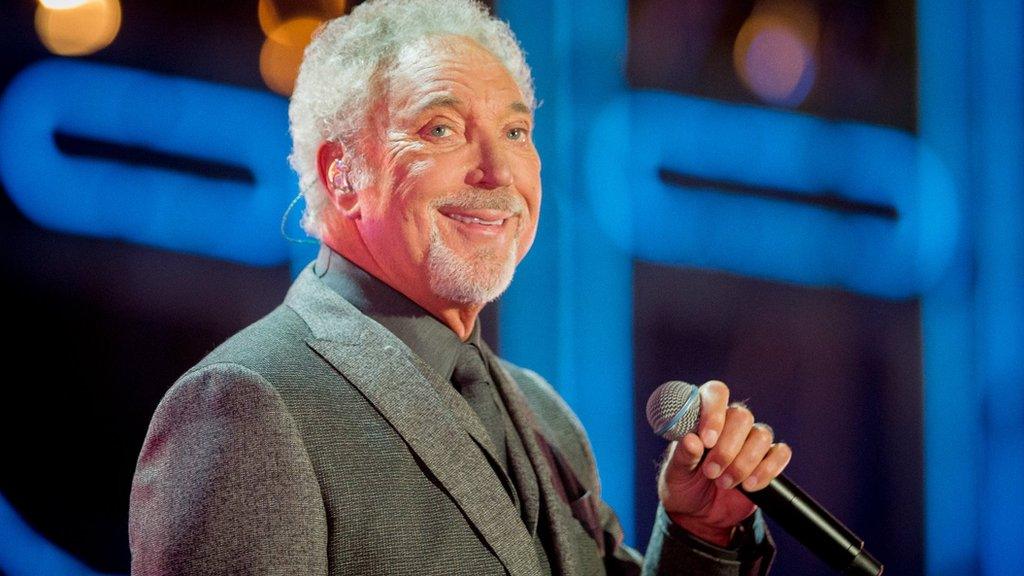
- Published20 April 2017
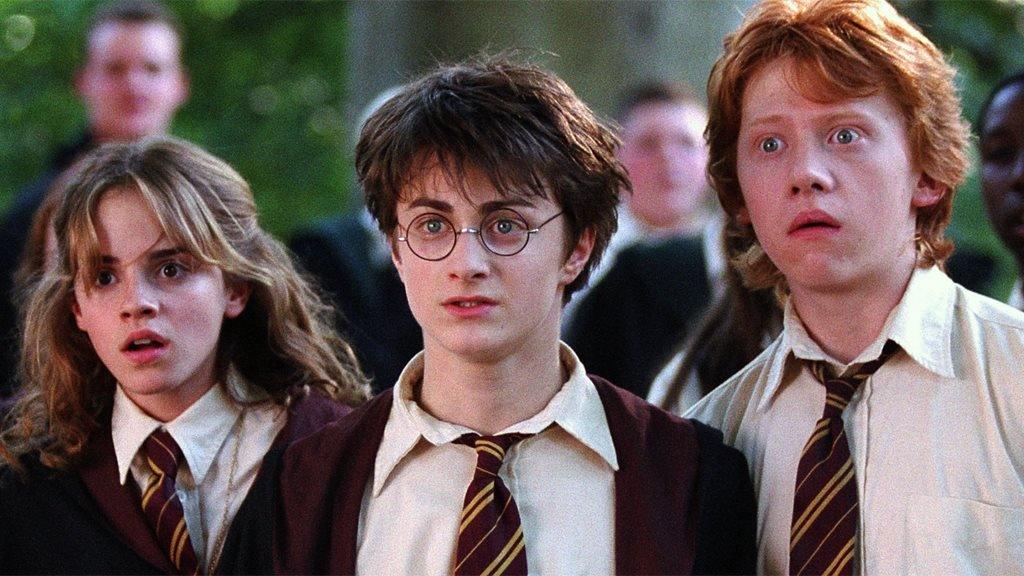
- Published20 April 2017
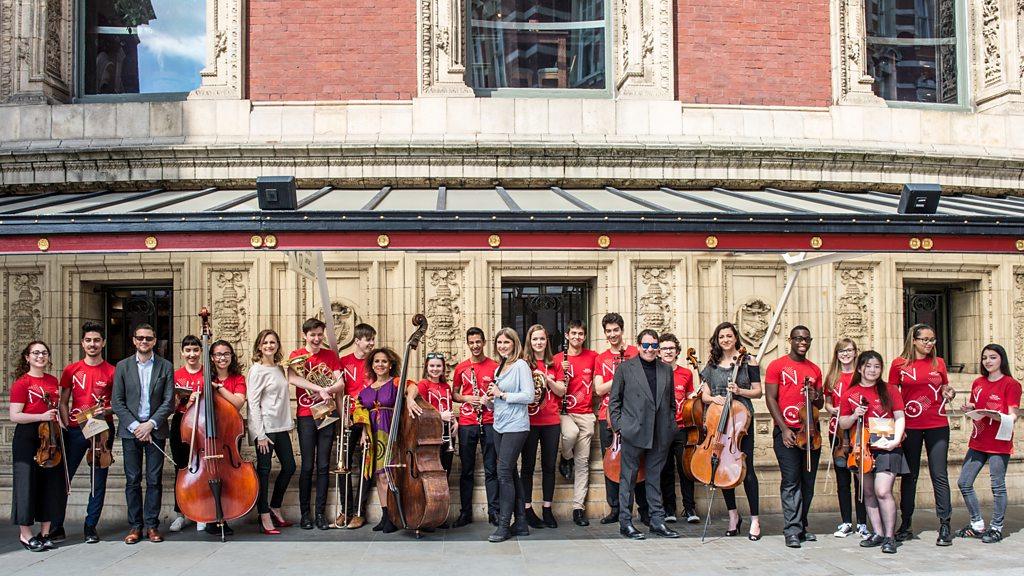
- Published20 April 2017
